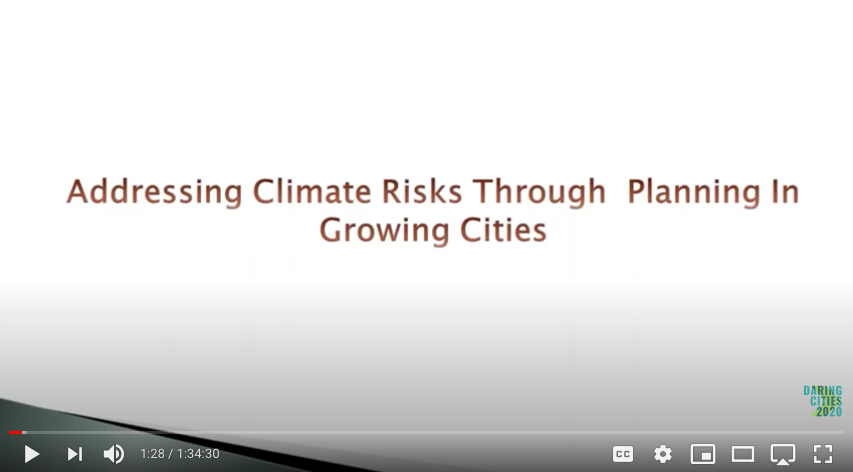
In order to access the video, you must create an account on Daringcities.org or log-in.
The world is getting urbanized. Half of the cities that will exist in 2050 have not been built yet. While existing cities already face a number of climate change risks, cities that are currently either being built or expanding still have options: may help in lowering their risks. Therefore, now is the time to develop a more comprehensive understanding of the climate change risks and their future impact.
In the past, researchers mostly focused on predicting hazards: They calculated changes in rainfall to predict flooding or changes in temperature to predict heatwaves or water scarcity. However, planning often did not take into account that while hazards will change over the next decades, so will the cities themselves and the populations that will be faced with these hazards. In reality, not only the hazard itself will make the difference, but also who encounters it, where do people encounter it and how prepared a city is to deal with it. Exposure matters, so how exposed people are where they live, and how vulnerable they are in general. Poor people who live in a low-lying area will be affected differently by the same level of flooding than people with more financial means who live in a different part of the city. Cities that have prepared for flooding will be affected differently than cities that have not.
In this session, we bring attention to these types of equally important factors that can either increase or decrease the exposure and vulnerability to such hazards and therefore enhance or lower climate change risks. By explaining key findings from the IPCC reports, academic insights and ground level experiences, we discuss possible pathways for growing cities, particularly those in the Global South, to reduce such exposures and vulnerabilities. Viewers should gain a practical understanding of the complex nature of climate change drivers and pitfalls to avoid.
Facilitator:
- Himanshu Shekhar, Associate Academic Officer, UNU-EHS, Bonn, Germany
Panelists:
- Hitesh Vaidya, Director, National Institute of Urban Affairs, New Delhi, India
- Matthias Garschagen, Professor – Human Geography, LMU, Munich, Germany
- Saskia Werners, Head, VARMAP Section, UNU-EHS, Bonn, Germany
- Christoph Woiwode, Indo German Center for Sustainability, RWTH Aachen, Germany/IIT Chennai, India
- Christian Barthelt, Munich Re Foundation, Munich, Germany
